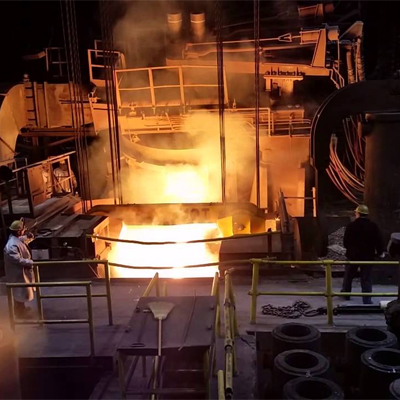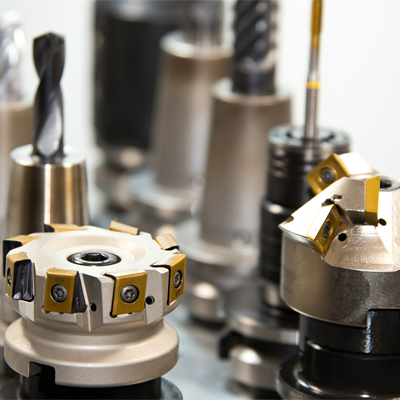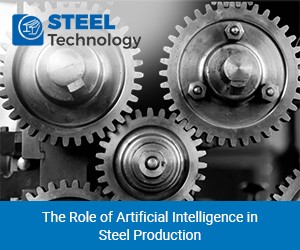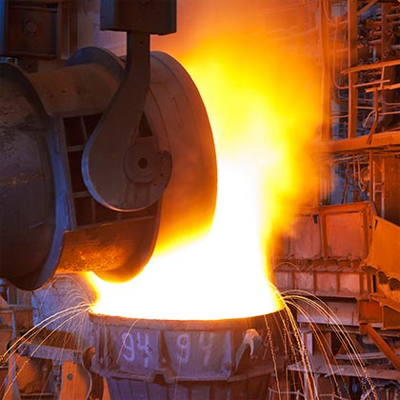The Future of Steel Manufacturing: Innovations in Industry 4.0

Introduction:
The landscape of steel manufacturing, a historical linchpin of industrial economies, is currently in the throes of a profound revolution amid the rise of Industry 4.0. This revolution finds its impetus in the convergence of digital technologies, automation, and data-driven insights, which collectively wield the power to reshape every facet of the steel industry. In the forthcoming in-depth exploration, we will embark on a journey into the future of steel manufacturing, unveiling the pioneering trends that are shaping this sector within the era of Industry 4.0.
1. Automation and Robotics Revolutionize Production:
One of the most striking developments in the steel industry's future is the increasing reliance on automation and robotics. Advanced robots equipped with artificial intelligence (AI) capabilities are being employed for a wide range of tasks within steel plants. These robots handle material transport, welding, and quality control with precision and efficiency. As a result, the steel manufacturing process becomes not only more efficient but also significantly safer, reducing the risks associated with human labor in hazardous environments.
2. Predictive Maintenance for Enhanced Reliability:
The implementation of predictive maintenance techniques, powered by data analytics and IoT sensors, is a game-changer for the steel industry. By equipping machinery and equipment with sensors that monitor performance, maintenance needs can be predicted with remarkable accuracy. This predictive approach minimizes downtime, reduces maintenance costs, and ensures optimal production efficiency. Steel manufacturers can now address potential issues before they lead to costly breakdowns.
3. The Rise of Smart Factories:
Steel manufacturing is transitioning towards smart factories, where an array of interconnected devices and systems communicate in real-time. The Internet of Things (IoT) is the driving force behind this transformation. IoT technology enables seamless monitoring and control of production processes, offering a level of connectivity that enhances decision-making, quality control, and resource management. Smart factories not only optimize existing processes but also pave the way for entirely new methods of production.
4. The Promise of 3D Printing and Additive Manufacturing in Steel:
The fusion of 3D printing and additive manufacturing techniques emerges as a compelling path toward the future of the steel industry. These cutting-edge technologies empower the fabrication of intricate and tailor-made steel components with unparalleled precision and swiftness. Beyond the reductions in waste and expenses, 3D printing unveils novel design horizons that once existed only in the realm of the unimaginable. This methodology for steel production inherently champions sustainability and adaptability, seamlessly aligning with the evolving needs of our ever-changing world.
| Also Read: Revolutionizing Steel Manufacturing: Unveiling the Power of Digital Twins |
5. Pursuing Sustainable Steel Production:
Sustainability has emerged as a paramount concern in the steel industry. Industry 4.0 technologies are being harnessed to reduce energy consumption and greenhouse gas emissions. Electric arc furnaces, for example, are gaining prominence as they use cleaner energy sources and are more energy-efficient compared to traditional methods. Additionally, recycling and waste reduction initiatives are playing a significant role in shaping the industry's environmental footprint.
6. Leveraging Big Data and Analytics:
The sheer volume of data generated within steel manufacturing processes is staggering. However, with the advent of big data analytics, this data becomes a valuable asset. Analytics tools can extract actionable insights from the data deluge, optimizing operations, improving product quality, and reducing costs. Predictive analytics, in particular, has the power to anticipate demand fluctuations and facilitate more effective inventory management.
7. Supply Chain Integration and Optimization:
Industry 4.0 facilitates seamless supply chain integration for steel manufacturers. Through real-time data sharing and communication between suppliers and customers, the supply chain becomes more efficient and responsive. This integration minimizes lead times, reduces inventory holding costs, and enhances overall supply chain performance. As a result, the steel industry is better equipped to meet the dynamic demands of global markets.
8. Workforce Transformation and Upskilling:
As automation becomes more prevalent, the role of the steelworker is evolving. Workers are required to adapt to operate and maintain advanced technologies. Upskilling and reskilling programs are essential to ensure a skilled workforce for the industry's future. This transformation of the workforce is not just about keeping up with technology but also about harnessing human creativity and problem-solving in an increasingly automated environment.
9. Cybersecurity Challenges:
With the increased connectivity of Industry 4.0, the steel industry faces new cybersecurity challenges. Protecting sensitive data and manufacturing processes from cyber threats is paramount to ensuring the integrity and reliability of steel production. Investment in robust cybersecurity measures is not only a necessity but also a strategic imperative.
10. Navigating Global Competition and Trade Dynamics:
The future of steel manufacturing is not solely shaped by technological advancements. It is also influenced by global competition and trade dynamics. Steel manufacturers must remain agile and adaptive in response to evolving trade policies, market demands, and geopolitical factors. A keen understanding of international trade dynamics and a willingness to explore new markets and partnerships will be crucial for industry players.
11. Advanced Materials and Alloys:
The future of steel manufacturing is not just about refining existing processes but also about pushing the boundaries of material science. Researchers are constantly exploring advanced materials and alloys that offer improved strength, durability, and environmental performance. Innovations in alloy composition can result in steel products that are lighter, stronger, and more corrosion-resistant, opening up new applications in construction, automotive, and aerospace industries.
12. Advancing Energy Efficiency and Sustainable Initiatives:
Throughout history, energy-intensive methods have defined steel manufacturing. Nonetheless, the dawn of Industry 4.0 heralds substantial strides in energy efficiency within the industry. Steel plants are progressively transitioning to renewable energy sources, including solar and wind power, effectively curbing the carbon footprint associated with production. These green initiatives extend further, encompassing reductions in water consumption, emissions mitigation, and the adoption of eco-friendly mining practices.
13. Circular Economy and Recycling:
Steel is inherently suited to a circular economy model due to its recyclability. Industry 4.0 technologies enable more efficient sorting and processing of scrap metal, contributing to a closed-loop system where end-of-life steel products are transformed into new materials. Embracing circular economy principles not only conserves resources but also reduces the environmental impact of steel manufacturing.
14. Mass Personalization and Customization in Steel Manufacturing:
Industry 4.0 is ushering in an era of mass personalization and customization in steel manufacturing. Thanks to advanced software and automation, the industry now has the capability to produce steel components tailored precisely to the specific needs of individual customers, all in real-time. This transformation not only minimizes waste and storage expenses but also enables manufacturers to swiftly adapt to the ever-changing demands of the market.
15. Collaboration and Industry Ecosystems:
Collaboration within the industry and the formation of ecosystems are driving innovation in steel manufacturing. Manufacturers are partnering with technology companies, research institutions, and startups to co-create solutions that address industry challenges. Such collaborations foster a culture of innovation and provide a fertile ground for the development of cutting-edge technologies.
16. Regulatory Compliance and Environmental Responsibility:
The future of steel manufacturing is closely linked to regulatory compliance and environmental responsibility. Steel companies are increasingly transparent about their environmental impact, aligning with global sustainability goals. Meeting and exceeding regulatory standards is essential not only for reputation management but also for gaining access to international markets.
Conclusion: Shaping the Future of Steel Manufacturing in Industry 4.0
The future of steel manufacturing, under the banner of Industry 4.0, is a dynamic fusion of innovation, sustainability, and adaptability.
Automation and robotics enhance efficiency and safety, while predictive maintenance minimizes downtime. Smart factories, driven by the Internet of Things, optimize production. Additive manufacturing opens new design horizons, reducing waste. Sustainability is central, with energy efficiency, recycling, and circular economy principles at the forefront. Customization and collaboration drive responsiveness. Regulatory compliance and environmental responsibility are non-negotiable.
In summary, steel manufacturing's future is a blend of tradition and technology, underpinned by sustainability. It's an industry poised for a renaissance, shaping a future where strength, resilience, and innovation reign supreme. The steel industry is ready to lead in a digital, connected, and sustainable world.











